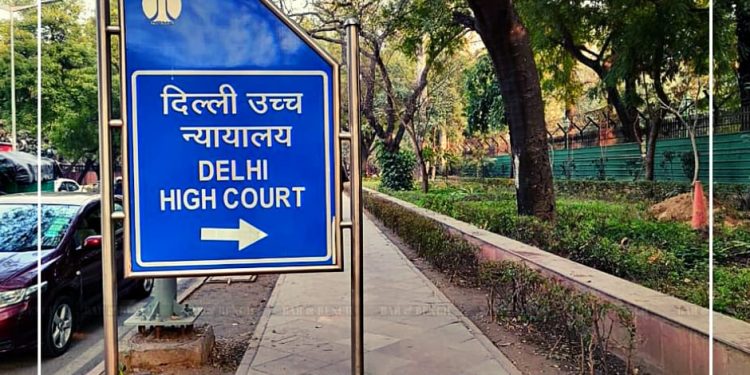The Delhi High Court in its order dated August 16, 2023 has ruled that falsely accusing spouse of extra-marital affair and repeated threats of suicide by wife is mental cruelty to the husband.
While upholding the family court’s decision to grant a divorce decree to a man, the bench of Justice Suresh Kumar Kait and Justice Neena Bansal Krishna observed:
False allegations of illicit relationship are the ultimate kind of cruelty as it reflects a complete breakdown of trust and faith amongst the spouses without which no matrimonial relationship can survive.
Wife threatening to commit suicide is cruelty to husband: Madras HC
Case:
Parties got married in 2009 at Dumka, Jharkhand as per Hindu rites & ceremonies and were blessed with a daughter in 2010.
Allegations by Husband:
After the wife left the matrimonial home in 2016, the husband filed for divorce in the year 2018 making the following allegations against his estranged wife:
(i) The respondent/wife used to pick quarrel on trivial issues and always remained adamant on her unjustified acts. She used to leave the home at times for 15 days to 1 month without any reason and without the consent of the respondent herein
(ii) The appellant/wife did not allow the respondent/husband for physical relations, sometimes for a span of 1 to 2 months
(iii) The appellant tried to poison the respondent in the month of January 2016. She tried to jump from the balcony but was saved by the respondent on time. She also attempted to kill the parents of the respondent in the year 2012-2013 by giving poison but they were able to thwart the attempt of the appellant who was thereafter sent to her parental home. Parents of the appellant/wife were also informed about the incident but instead of counselling the appellellant, they put the blame on the parents of the respondent/husband
(iv) The appellant also levelled allegations that the respondent was having illicit relations with other woman
(v) There has been no cohabitation since 29.03.2016 and they have been living separately since then
NGO Launches Jaipur Helpline For Men In Distress, Addressing Rising Male Suicides & Misuse Of Gender-Based Laws
Submissions by Wife:
No written statement was filed on behalf of the wife in the Divorce Petition to rebut the allegations made against her. The averments made in the Divorce Petition were duly proved by the husband herein by way of affidavit of evidence.
However, while contesting the divorce in High Court, the argument from the wife’s side read as below:
She being a lady living in far remote corner of Jharkhand, was not having enough financial capacity to contest the petition. It is asserted that the learned Judge, Family Courts erred in concluding that the service upon father of the appellant was a proper service.
No personal service was effected on the appellant and she had been wrongly proceeded ex-parte.
Family Court
The learned Judge, Family Court observed that that the acts as narrated by the respondent herein amounted to ‘mental cruelty’ and granted the divorce vide the impugned Judgment dated 28.01.2019. Aggrieved by the decree of divorce, the wife challenged the same in Delhi High Court.
Wife Turned Accident Into Her Attempt To Die By Suicide | Mumbai Court Acquits Husband, His Parents From 498A IPC After 9-Years
Delhi High Court
A division bench consisting Justice Suresh Kumar Kait and Justice Neena Bansal Krishna analysed the facts on record and remarked on every aspect accordingly.
With regards to the false allegations of an illicit relationship, the High Court termed this as the “ultimate kind of cruelty,” that erodes the trust essential for a successful marital relationship. The High Court observed:
False allegations of illicit relationship are the ultimate kind of cruelty as it reflects a complete breakdown of trust and faith amongst the spouses without which no matrimonial relationship can survive.
The High Court noted that the wife could not establish any evidence which pointed out towards husband’s extra marital affair.
On wife leaving matrimonial home frequently
The court observed that cohabitation is a crucial element of a marital relationship and thus the wife leaving the husband for extended periods without notice and withholding cohabitation were significant factors. The bench further noted:
Regular quarrels may be trivial when considered individually, however, collectively, these quarrels on a regular basis can not only disrupt the mental peace but also become a source of mental agony.
READ ORDER | Can Husband & His Family Be Automatically Held Responsible If Wife Dies By Suicide After 17-Years Of Marriage? Telangana High Court
On Wife’s attempt to suicide
The High Court noted that the wife had attempted suicide by jumping from a balcony and kept giving suicide threats repeatedly, which took a toll on the man’s mental well-being and affected the marital relationship. To this, the bench stated:
The repeated threats to commit suicide and the attempt to commit suicide was held to be an action amounting to cruelty by the Supreme court in the case of Pankaj Mahajan vs Dimple (2011).
It was further observed this postulates a treatment of a spouse with such cruelty that it would be harmful or injurious to live with the other spouse.
Divorce Upheld
Dismissing the wife’s plea, the Delhi High upheld the family court’s judgment granting divorce to the husband under Section 13(1)(i-a) of the Hindu Marriage Act, 1955.
DO WATCH:
Should Daughter-in-Law Be Allowed In Matrimonial Home After Domestic Violence Against In-Laws?
LEAVE YOUR COMMENTS BELOW:
Join our Facebook Group or follow us on social media by clicking on the icons below
If you find value in our work, you may choose to donate to Voice For Men Foundation via Milaap OR via UPI: voiceformenindia@hdfcbank (80G tax exemption applicable)































